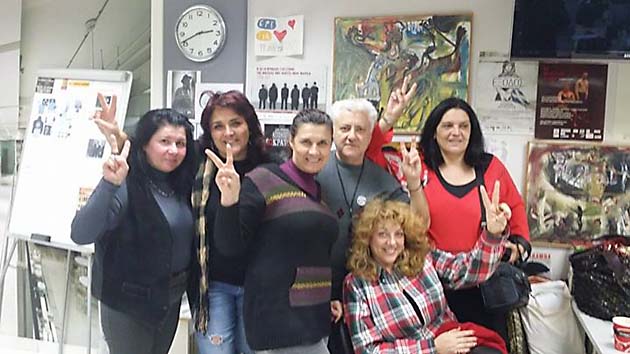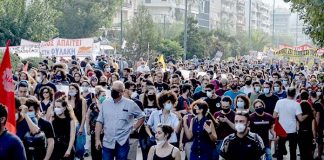Since the shut-down of the Greek public broadcaster ERT by the government in June 2013, the workers’ occupation of the television and radio station has become a symbol of mass resistance to austerity.
The ERT radio station, located across the road from the main television station which police illegally raided and evicted in 2013, remains under workers’ control. Without an income, journalists and radio presenters are now producing content an unpaid basis for online broadcast at www.ertopen.com
Workers are demanding the re-instatement of the public broadcaster under the next government, which will most likely be a left government led by radical left party SYRIZA.
With less than two weeks to go till the historic elections on January 25, Jimmy Yan spoke to a group of workers at the station about their expectations and hopes for the struggle ahead.
Tell us about your struggle at ERT and the history of the workers’ occupation here.
Daisy: We are employees of ERT who have been illegally fired. Since, being forced out of the television station across the road by a police raid in November 2013, we have been occupying the radio station under workers’ control.
Erini: On June 11 2013, we heard through television without any proper or prior information that ERT is going to shut down. Against the decision of the government, we made an instant decision to keep ERT alive by occupying. We stayed inside the building from day one. We asked society to give its solidarity. There was a big response. Millions of people across Greece both outside the building and inside the building supported our decision to occupy. We continued producing programs and everything was like before – television, internet, radio, everything.
Anna: As part of the initial occupation, there was also a live radio music festival which went on for 150 days. It was universally the biggest music festival that has ever happened on a public radio station. It was everyday, a different musical event.
Can you describe your day-to-day experience of running ERT under workers’ control?
Daisy: In this building [the radio station] or that building [the former ERT television station]? because there is a slight difference. There, we had all the machinery and all the equipment before being evicted by police. Here, we had to create much of it from scratch. So here it was more difficult in the beginning.
Erini: Our first achievement was winning wider solidarity. Throughout our struggle, society has been with us. We are one team with the people helping us, and we also helping the people. So solidarity is vice-versa. The programs we produce now are very different from the programs that were produced when ERT was open because we are now a part of society. We don’t receive instructions from government representatives asking for things to happen. So we are now an expression of society, and society is expressed through us.
The upcoming election on January 25 will likely deliver a left government led by SYRIZA. What are your expectations and hopes from a SYRIZA government? What are the next steps for the struggle?
Gabriel: After five years, Greek people know very well what austerity and unemployment means. In this election, the future of the greek people will be changed. They will change the political situation with new parties to oppose austerity, oppose the memorandum and oppose Merkel.
Erini: It will be very positive for Greece to have a left government. It will be the first left government in many years. But as workers who have been struggling for all these months, these past 19 months, we will not stop struggling. We will continue what we were doing, because struggle is now a part of our working day. We will fight to re-establish all the rights as workers and as citizens of this country that have been attacked under this government. And we will not stop coming out onto the streets, because without being out in the streets you cannot protect what you have fought for. We don’t believe that anything will be given to us as a gift and without a fight.
Three elections ago, the government of George Papandreau promised to re-open Olympic Airways and and he didn’t do it. So although Syriza are saying they will re-open ERT, we cannot be complacent. Whether the next government will or will not reinstate us, we do not know and shouldn’t expect anything. We as the workers should do it ourselves.
Stavros: The whole situation under the troika reminds us – at least of people who know more about our recent history over the last 100 years – much like a junta. A strange kind of junta of course, because there is no army here. But it is still our opinions that cannot be heard freely. Our will as a people cannot be limited to voting because decisions are taken abroad and they are imposed upon us. What we lost is not just our jobs. For some people, it is really more than that. They lost their dignity. The most important thing that we lost under austerity is our democracy, and the ability of people to decide their future for themselves.
What kind of solidarity have you received from wider society and the wider workers’ movement?
Erini: Initially, the main solidarity and help came from the unions. Alongside university workers who were among the first to face mass lay-offs, we as illegally fired employees of ERT formed a union to oppose sackings and closures in the public sector.
Secondly, we have built support through organising protests on the streets. When we needed support, we would call on people to attend big street gatherings. Finally, we have also received financial support, both from wider society and from unions. We created t-shirts, sweaters, lighters, pens and pins which we sold to raise money. And we have a bank account which people can make contributions into.
Workers in the electricity and telecommunications companies also helped us. We would be in contact with them every time the government tried to cut off power and communications to the occupied ERT, and they would keep us updated. From the villages and the islands to the smallest towns, people protested in our support. So we eventually forced the government to abandon their efforts against us. It didn’t happen because we would not let it happen.
Anna: Three weeks ago, a common effort was made to raise funds on television. The campaign started in one of the Greek islands, but musicians from all over Greece said “we would like to offer to play a piece. We’ll sing it, and it’s for you”. So we created a TV concert and you can view it from here, from Thessaloniki and from all the regional areas throughout Greece. This was a way to fundraise and for people to show their solidarity.
Finally, how can people build international solidarity with the ERT workers?
Erini: Very nice question. On the second month of the ERT occupation, the firefighters of Melbourne from gave funds to our struggle here. So they must have learnt about our struggle from somewhere. The most important thing is to share the media itself. Share it widely, broadcast it, and share it through word of mouth so that people know what we’re doing here. We want others who have been illegally thrown out of their jobs to to know that if we can do it, everybody can do it.
Anna: Another way of helping us besides spreading the news of what’s going on in Greece is financial support because we’re not getting paid. We’re not getting a penny, or even a cent from what we’re doing. But we need to have money, to have an internet connection, to have television, to have electricity, to have the means to travel throughout Greece so we can connect with our colleagues in the regional areas. And with the weather and heavy rain, the transmitters up on the mountains need to be maintained and repaired very often. We need technicians who can to go up there and to fix everything.
We have a big community of Greeks in Australia. You should get organised to spread the news to other people. We get telephone calls, we get mail, from [the Greek diaspora] who tell us “we miss ERT. We don’t have any way to listen what is going on or to watch”. You should do it now, the elections are coming.
Workers pictured above:
ERINI is a journalist and the chief news editor of the ERT Open. She is also a candidate for the anti-capitalist coalition ANTARSYA in the upcoming election.
ANNA is a classical musician and a member of the Greek National Symphony Orchestra, now under workers-control. She is also a member of ANTARSYA.
DAISY PAPACONSTANTINO worked in television entertainment prior to the closure of ERT. She now has a variety of different responsibilities including producing news bulletins, television promotions, social media, and fundraising, in addition to working part time at the union across the road. Many thanks to Daisy for interpreting.
STAVROS works in technical support, maintaining radio transmitters.
GABRIEL KASSIMITIS is the General Secretary of POSPERT, the union representing ERT journalists.






